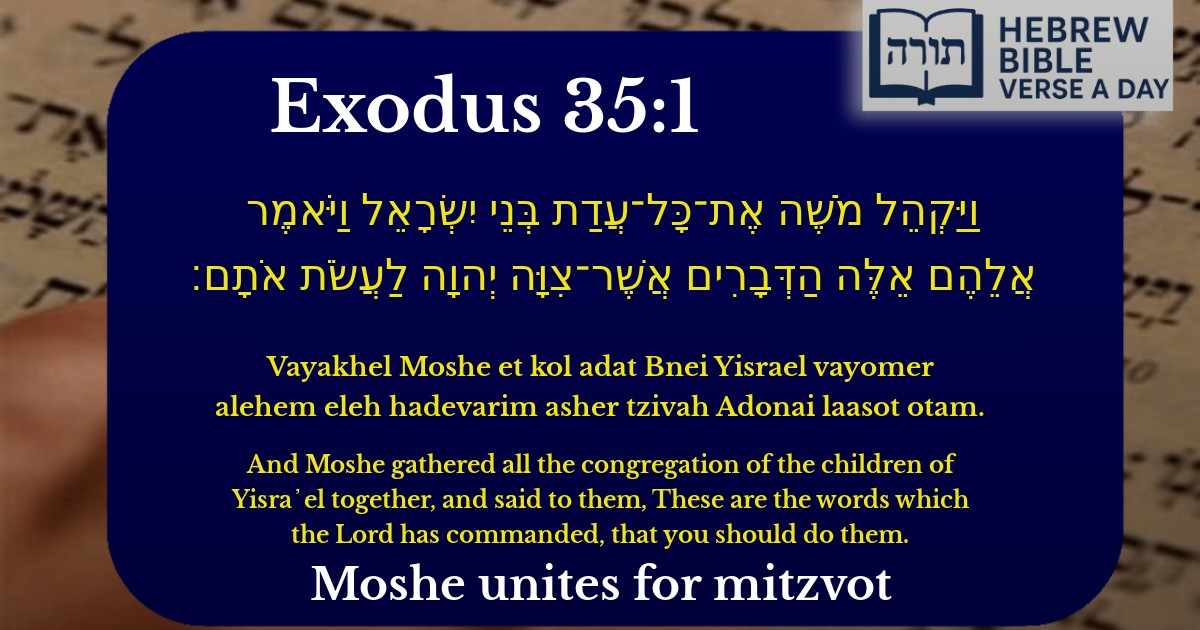Join Our Newsletter To Be Informed When New Videos Are Posted
Join the thousands of fellow Studends who rely on our videos to learn how to read the bible in Hebrew for free!
Hebrew Text
וַיַּקְהֵל מֹשֶׁה אֶת־כָּל־עֲדַת בְּנֵי יִשְׂרָאֵל וַיֹּאמֶר אֲלֵהֶם אֵלֶּה הַדְּבָרִים אֲשֶׁר־צִוָּה יְהוָה לַעֲשֹׂת אֹתָם׃
English Translation
And Moshe gathered all the congregation of the children of Yisra᾽el together, and said to them, These are the words which the Lord has commanded, that you should do them.
Transliteration
Vayakhel Moshe et kol adat Bnei Yisrael vayomer alehem eleh hadevarim asher tzivah Adonai laasot otam.
Hebrew Leining Text
וַיַּקְהֵ֣ל מֹשֶׁ֗ה אֶֽת־כׇּל־עֲדַ֛ת בְּנֵ֥י יִשְׂרָאֵ֖ל וַיֹּ֣אמֶר אֲלֵהֶ֑ם אֵ֚לֶּה הַדְּבָרִ֔ים אֲשֶׁר־צִוָּ֥ה יְהֹוָ֖ה לַעֲשֹׂ֥ת אֹתָֽם׃
Parasha Commentary
📚 Talmud Citations
This verse is quoted in the Talmud.
📖 Shabbat 70a
The verse is referenced in the discussion about the prohibition of kindling fire on Shabbat, as part of the broader context of the commandments given to the Israelites.
📖 Yoma 75b
The verse is cited in the context of discussing the gathering of the Israelites and the commandments given to them, particularly in relation to the observance of Yom Kippur.


Context of the Verse
The verse (Shemot 35:1) opens the section detailing the construction of the Mishkan (Tabernacle). Rashi explains that this gathering took place on the day after Yom Kippur, when Moshe descended from Har Sinai with the second set of Luchot (Tablets), signaling Hashem's forgiveness for the sin of the Golden Calf. The phrase "ויקהל משה" ("And Moshe gathered") emphasizes the unity of Bnei Yisrael after their previous division.
The Significance of Gathering
The Midrash Tanchuma (Vayakhel 1) notes that the word "ויקהל" (gathered) is related to "קהל" (community), teaching that the Mishkan could only be built through collective effort. Ramban adds that this gathering mirrored the unity at Har Sinai, reinforcing that the Mishkan would serve as a continuation of the Sinai revelation.
"These are the Words" – The Commandments
Rashi clarifies that "אלה הדברים" ("These are the words") refers specifically to the 39 categories of Melacha (forbidden labor on Shabbat), which Moshe introduces before discussing the Mishkan. This teaches that Shabbat observance takes precedence even over building the Mishkan (Mechilta d'Rabbi Yishmael). The Talmud (Shabbat 70a) derives from here that the prohibitions of Shabbat were given at Marah before Matan Torah.
The Language of Command
The phrase "צוה ה' לעשות אותם" ("Hashem commanded to do them") uses the infinitive "לעשות" (to do), which the Sforno explains emphasizes action over mere intellectual understanding. The Kli Yakar highlights that the plural "אותם" (them) includes both the positive and negative commandments related to the Mishkan and Shabbat.
Practical Halachic Implications